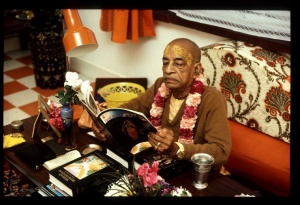CC Antya 2.14: Difference between revisions
m (1 revision(s)) |
No edit summary |
||
| Line 1: | Line 1: | ||
{{ | [[Category:Sri Caitanya-caritamrta - Antya-lila Chapter 02|C014]] | ||
<div style="float:left">'''[[Sri Caitanya-caritamrta|Śrī Caitanya-caritāmṛta]] - [[CC Antya|Antya-līlā]] - [[CC Antya 2|Chapter 2: The Chastisement of Junior Haridāsa]]'''</div> | |||
<div style="float:right">[[File:Go-previous.png|link=CC Antya 2.13|Antya-līlā 2.13]] '''[[CC Antya 2.13|Antya-līlā 2.13]] - [[CC Antya 2.15|Antya-līlā 2.15]]''' [[File:Go-next.png|link=CC Antya 2.15|Antya-līlā 2.15]]</div> | |||
{{CompareVersions|CC|Antya 2.14|CC 1975|CC 1996}} | |||
{{RandomImage}} | |||
==== TEXT 14 ==== | ==== TEXT 14 ==== | ||
<div class="verse"> | |||
<div | :sei jīve nija-bhakti karena prakāśe | ||
sei jīve nija-bhakti karena prakāśe | :tāhāra darśane ‘vaiṣṇava’ haya sarva-deśe | ||
tāhāra darśane ‘vaiṣṇava’ haya sarva-deśe | |||
</div> | </div> | ||
| Line 13: | Line 16: | ||
==== SYNONYMS ==== | ==== SYNONYMS ==== | ||
<div class="synonyms"> | |||
<div | ''sei jīve''—in that living being; ''nija-bhakti''—His own devotion; ''karena prakāśe''—manifests directly; ''tāhāra darśane''—by seeing such an empowered devotee; ''vaiṣṇava''—devotees of Kṛṣṇa; ''haya''—become; ''sarva-deśe''—in all other countries. | ||
sei | |||
</div> | </div> | ||
| Line 21: | Line 23: | ||
==== TRANSLATION ==== | ==== TRANSLATION ==== | ||
<div class="translation"> | |||
<div | |||
Thus He empowered living beings [His pure devotees] by manifesting in them so much of His own devotion that people in all other countries became devotees by seeing them. | Thus He empowered living beings [His pure devotees] by manifesting in them so much of His own devotion that people in all other countries became devotees by seeing them. | ||
</div> | </div> | ||
| Line 28: | Line 29: | ||
==== PURPORT ==== | ==== PURPORT ==== | ||
<div class="purport"> | |||
As stated in the ''Caitanya-caritāmṛta'' ([[CC Antya 7.11|CC ''Antya'' 7.11]]): | |||
:''kali-kālera dharma—kṛṣṇa-nāma-saṅkīrtana'' | |||
:''kṛṣṇa-śakti vinā nahe tāra pravartana'' | |||
Unless one is empowered by the Supreme Personality of Godhead, Śrī Caitanya Mahāprabhu, one cannot spread the holy names of the Hare Kṛṣṇa ''mahā-mantra'' throughout the world. Persons who do so are empowered. Therefore they are sometimes called ''āveśa-avatāras'', or empowered incarnations, for they are endowed with the power of Śrī Caitanya Mahāprabhu. | |||
</div> | |||
<div style="float:right; clear:both;">[[File:Go-previous.png|link=CC Antya 2.13|Antya-līlā 2.13]] '''[[CC Antya 2.13|Antya-līlā 2.13]] - [[CC Antya 2.15|Antya-līlā 2.15]]''' [[File:Go-next.png|link=CC Antya 2.15|Antya-līlā 2.15]]</div> | |||
</div> | __NOTOC__ | ||
__NOTOC__ | __NOEDITSECTION__ | ||
Revision as of 05:10, 20 September 2021

A.C. Bhaktivedanta Swami Prabhupada
TEXT 14
- sei jīve nija-bhakti karena prakāśe
- tāhāra darśane ‘vaiṣṇava’ haya sarva-deśe
SYNONYMS
sei jīve—in that living being; nija-bhakti—His own devotion; karena prakāśe—manifests directly; tāhāra darśane—by seeing such an empowered devotee; vaiṣṇava—devotees of Kṛṣṇa; haya—become; sarva-deśe—in all other countries.
TRANSLATION
Thus He empowered living beings [His pure devotees] by manifesting in them so much of His own devotion that people in all other countries became devotees by seeing them.
PURPORT
As stated in the Caitanya-caritāmṛta (CC Antya 7.11):
- kali-kālera dharma—kṛṣṇa-nāma-saṅkīrtana
- kṛṣṇa-śakti vinā nahe tāra pravartana
Unless one is empowered by the Supreme Personality of Godhead, Śrī Caitanya Mahāprabhu, one cannot spread the holy names of the Hare Kṛṣṇa mahā-mantra throughout the world. Persons who do so are empowered. Therefore they are sometimes called āveśa-avatāras, or empowered incarnations, for they are endowed with the power of Śrī Caitanya Mahāprabhu.